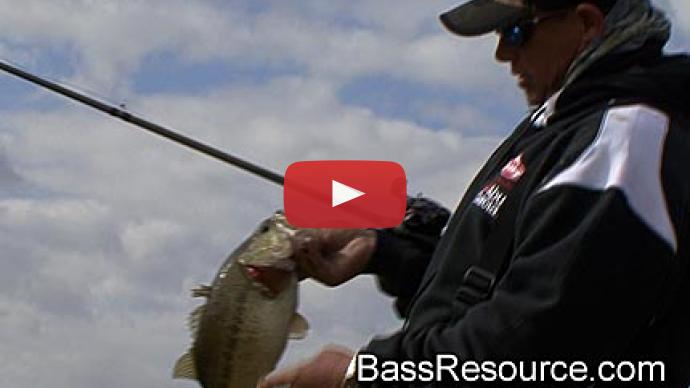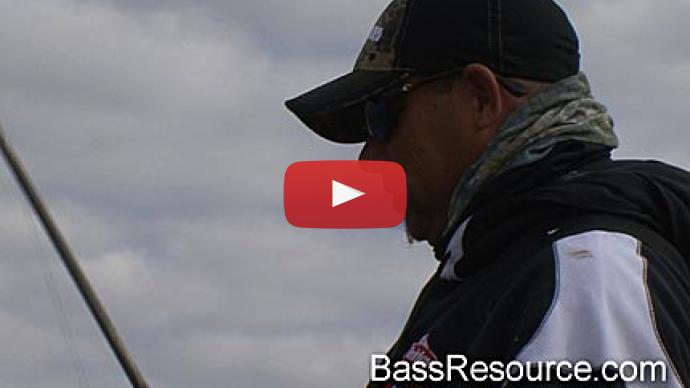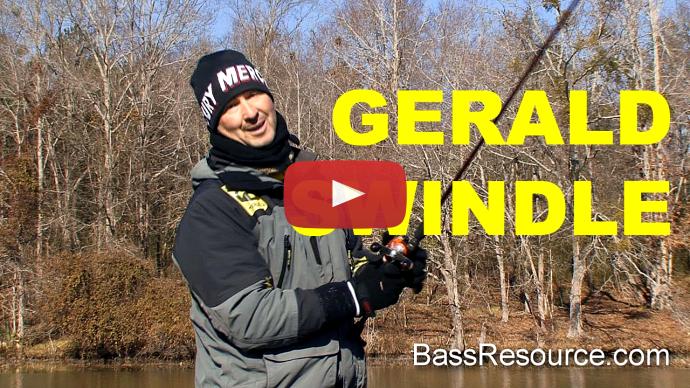In this episode, Bobby reveals his pre-fish tactics, what it's like to be a pro, and how to become a pro!
Glenn: When you're fishing an unfamiliar body of water for the first time, what do you do first?
Bobby: I fish my strengths. I look at the time of the year, if it's cold or something, I'll take an old spinnerbait or Rat-L-Trap and go beat down the banks. If it's got grass in it, I'll go to an area of the lake that looks like it might have grass.
If it doesn't, I'll start shallow almost all the time, then work my way up.
Glenn: Do you spend a lot of time running around?
Bobby: Yeah, the first day normally I will.
Glenn: You find yourself plastered to the GPS and the depth finder more so, or is it find a spot, fish it hard, or what do you do?
Bobby: You mix it up. You want to look at everything you can, and try to find the area that you like the best.
Find the areas you like the best and try to make a bite of what you like to fish with.
Glenn: Have you ever tried using fluorocarbon with top water bait?
Bobby: No. I'm not a fan. I like fluorocarbon, but I will not use it with top water. That is a no-no.
Glenn: Why is that?
Bobby: It sinks. I've always grown up throwing it with mono or braid, and just got more confidence in it. It keeps the bait up. Fluorocarbon, it just sinks, it's no good. Just a no good.
Glenn: How do you prepare physically for a long tournament?
Bobby: When you're on the road, you eat right or try to. Subway or a salad, or fish, anything like that. You don't want to be loading yourself up with too much fats before a tournament.
Sometimes it's three weeks, or sometimes it's a month or a month and a half. You've got to be able to go hard the whole time, because your competitors will. They won't cut you any slack.
Glenn: Do you have any kind of exercise regimen you adhere to?
Bobby: I don't. Sometimes when I'm home I get on a little deal, then I get on as quick as I get on it. You just want to stay ready. You've got to be ready. These guys here, a lot of them exercise, a lot of them do stuff before tournaments. You can't compete against those kinds of guys in a long term deal if you're not ready.
When it's a fast moving bite or if it's a slow moving bite or whatever, you've got to be on your A game.
Glenn: One of the guys on our forums wants to know your thoughts on pre-fishing in a tournament. Would you rather have one more day, or would you rather not have pre-fishing at all?
Bobby: I like it the way it is. Two and a half days is plenty. It gives you enough time to look at what you need to look at, and not get greedy with anything. You can eliminate a lot with two and a half days.
You can pinpoint them with two and a half days also, so I think two and a half's just about right.
Glenn: What do you do during a tournament if your game plan isn't panning out the way you desired?
Bobby: Usually it's jump ship. Go to the other end of the lake. Don't fish for little fish. If 25 pounds won the week before, and you've got eight pounds in the box and the weather's probably pretty much the same, you know you're in trouble.
You need to go to a different area, or different grass flat. Mix up your whole strategy, just go somewhere new and try it. A lot of times, some of my better stringers have come just going blind, running new water and fishing the way I like to fish.
Glenn: You'd rather change location first than change lure color or anything like that?
Bobby: Yeah. I like a whole brand new start, if everything's going to pot on me.
Glenn: Bobby, could you give the weekend angler an honest viewpoint of what being a professional angler is all about? After you catch this fish.
Bobby: Do what?
Glenn: Can you give the weekend angler an honest viewpoint of what being a professional angler's all about?
Bobby: Being a professional angler, you definitely earn it. It isn't something you're just tattooed with the minute you're born. It's something that I've worked for, it wasn't given. I wasn't born with a silver spoon by no means at all.
A lot of heart, dedication, being away from your family for sure.
There's enjoyment in competitiveness. It's got all the fun things. If you love to fish, this just adds about 10, 15 times more to it. It's something that's, whether I do good in this Bassmaster Classic or not, I made it here, and that's the first thing.
It's something that not everybody can say they can do. Everybody can not be a professional football player, basketball player or golfer, but there's a lot to say when you can say you're a professional fisherman.
There's millions of people out there trying to become what we do. Either we're dumb enough to do it, or we just actually do well enough to keep at it. It's something you strive to get better at, it's a weird game. You never can learn enough about this fishing. There's always something more to learn about bass fishing. Just when you think you've got it all, you get your butt kicked.
I love what I do for a living. I'd never change it. It's a thrill when you catch them, it's a rush, it's the excitement that you can pour out is next to none. Nobody else can take that away from you, for sure.
When you have a good day or you have a good tournament, it's something you'll remember forever. When you finally win your first tournament like I did in 2009, it's something that I'll remember for the rest of my life. It was an awesome deal, it's something I strived for my whole life, and I finally conquered it.
Next is to win one of these tournaments, and the next will be to win a Bassmaster Classic or win Angler of the Year. There's a whole lot to do, and it's just something that I think every angler should give it a shot, if that's really what they want to do.
I don't think you can be demeaned, or whatever the word it is I'm looking for, for saying you went and tried to do something that you really wanted to do.
It's a special place in my heart always, and my grandfather gave to me and he passed away, and now my dad, he carries it on. It's neat when your dad calls every morning at 5:00, 6:00 on the way to the tournament. If you had your worst day or your best day, he'll still call you and wish you the best of luck.
When you've got family behind you and support, and fans and everything else, you're living the dream is basically what it comes down to.
Glenn: How did you get your start?
Bobby: Basically, my younger brother, Chris, fished BFLs years ago. Started out at the regional fishing BFLs. He made the regionals first year, and I felt like me and him and Arnie were all competitive at bass fishing.
I said, "You know what, I'm going to give that a try." I went to the BFL to regional, and straight to the All-American. I did that two years in a row, then I qualified through the Strens for the FLW, and fished there for three years.
Qualified for the Bassmaster Classic and the Elite series in 2008, or 2007. 2007, I guess.
Swapped over, was Rookie of the Year in 2008, and Rookie of the Year in FLW. All that came from not phone calls and information, it came from putting my heart into it and everything I had. Said I'm going to go out there and do this because this is what I want to do.
When the big fish bite, you put them in the boat. When it's your time to catch them or a lake you go to, you expect to do well. You want to do well.
Get your name out there and speak with sponsors, get with the right company, let them know you're interested and you're a marketable angler. They'll work with you. If there's something they don't like or whatever, they'll tell you about that.
Just basically, I've stuck with it through thick and thin. This is where I'm at today.
Glenn: What would you say is your one defining moment where you said, "This is it. I can do this for a living."
Bobby: I used to own a lawn service back in my younger days. I fished more than I was working. I had a couple guys working for me when I was out of town.
I got a call from my dad one morning and told me that a guy had run over a couple doormats at a church we used to mow, and was messing up some other properties. I said, "It's time for me to make a decision. Either I'm going to be a lawn boy the rest of my life, or I'm going to go out and try this fishing business."
It took me about three seconds to make that decision. I got back home after a second or third place somewhere, making some really good money, and sold my lawn business and started up the fishing career.
Glenn: You owe your career to some ruined mats?
Bobby: You got it, buddy. Now I love to ruin mats with my flipping stick.
Glenn: Bobby, with so many guys competing now, wanting to make their way and be a pro, it's hard to win a tournament. How does a guy know when he's ready to step up to the next level if he hasn't won a tournament yet?
Bobby: That's a pretty good question. It's all about winning, of course. Everybody wants to win.
Boy, it just doesn't happen very often. I think once you get your name out there and get in the top five, top ten in more than a few events, when your name's up there more than not up there, I think that's when you know you're ready.
I think winning just comes with putting yourself in a position enough times to win a tournament. Eventually it will happen. I don't think you have to win a tournament to join a Bass Federation, or Open or Elite tournament. Or a Classic. None of that.
I think you have to prove to yourself or to other people that you're not in this just because you're qualified for two tournaments throughout the year or something like that. I think it goes a little further than that.
Glenn: What would you say is the biggest misconception about pro-anglers?
Bobby: That they have everything taken care of. "Oh, you get all this for free," or you this or that. I get tired of hearing that. "Come on, man, come off of this."
We earned what we got, and people think that we just make a ton of money doing all kinds of things. That isn't the way it goes.
That's the biggest complaint. People always . . .
[referring to fish in the water]
There's another one that hit it. There, he got it that time. Come on, show me a big one. Look at the guts on these things. They're not big. I'm going to keep firing out there until I see a good one. Fun though.
Glenn: No kidding.
Bobby: Look at that one. Look at that.
That's a little more like it, isn't it? What's that fish weigh, maybe. Three and three quarters?
Glenn: Maybe a little more than that.
Bobby: You think?
Glenn: Yeah.
Bobby: Well, we're done here, too.
Well, it's the end of the day, and what a day it was. We made that long run to Venice today, and learned how to get there and how to get back. Learned both routes. It was fun.
I enjoyed your guys' questions today, and look forward to answering the rest of them right after this Bassmaster Classic. I'll catch you then.



